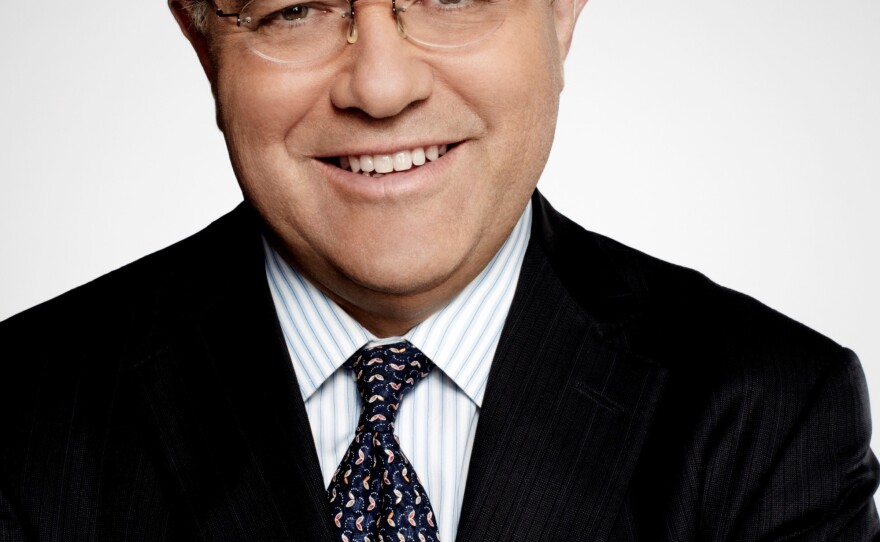
In his profile of Supreme Court Justice Ruth Bader Ginsburg in this week's issue of The New Yorker, Jeffrey Toobin writes: "Ginsburg has suggested that she would like to serve as long as Louis Brandeis, her judicial hero, who retired at eighty-two." Ginsburg turns 80 this month and is marking her 20th year on the court. She has had cancer -- colon and pancreatic -- and her tiny, frail-looking stature leads many people to wonder if she'll be retiring soon.
"Looks are deceiving when it comes to Ruth Bader Ginsburg," Toobin tells Fresh Air's Terry Gross. "She looks like a stiff wind would blow her over ... but it turns out she's kind of the monster of the Supreme Court gym. Who knew, right? She is someone who is just small, but she is tough as nails. She's got all her marbles. She works out regularly, and she is not leaving imminently."
Ginsburg is on the liberal wing of the court, which these days is usually often in the minority. Toobin says that while she would like to retire while a Democrat is in the White House, the irony of her current status is that she has never been more powerful at the court. He says that the three other liberal justices -- Elena Kagan, Sonia Sotomayor and Stephen Breyer -- defer to her, especially when they are in dissent.
"The four liberals are not fragments," says Toobin. "They are together, and that's really Ginsburg's work. ... That is a matter ... of persuasion. She has said, 'We would be more powerful. We would have more of an impact on -- potentially -- other courts or the future of the courts if we -- the four of us -- speak together. I think it's testament to Ginsburg's respect that she engenders among her colleagues that even though the other three don't have to defer to her, they do."
Interview Highlights
On Ginsburg's 1992 lecture at the NYU Law School, and how it reveals her approach to litigation
"The great women's rights landmark that Justice Ginsburg did not argue as a lawyer was Roe v. Wade, the abortion rights case. That case was litigated and decided very differently from the way Ginsburg's cases were decided. Roe v. Wade -- Justice Blackmun's decision for the court -- didn't just declare the Texas law at issue unconstitutional, it said that every law in every state that barred early abortions for women was now unconstitutional, and Ginsburg, in this lecture, said that she thought the court was wrong to do that in Roe v. Wade. Ginsburg is a supporter of abortion rights, but she thought the court went too far, too quickly in ordering every state of the union, and she thought it set off a political backlash that actually wound up hurting the cause of women's rights."
On how the first two female justices on the Supreme Court responded to sexist treatment they experienced
"Justice O'Connor was very aware of sexist treatment that she received, both before and after her appointment to the Supreme Court and she, like Justice Ginsburg, had excellent radar for being patronized by her colleagues -- most especially Justice Scalia. So I think there are actually many more parallels between Ginsburg and O'Connor than there are differences, starting with their academic distinction and difficulties getting jobs. Also, I think the affection between them was so real. I remember interviewing Justice Ginsburg once during that period before Justice Sotomayor was appointed, where she was the only woman on the court, and she hated that. She really didn't like being the only woman on the court, and she liked the fact and O'Connor liked the fact that they were different in many ways. You know, here you have O'Connor, this tall, outgoing, rangy Westerner, and Ginsburg, this bookish Brooklynite. And they both like the idea that it shows that women aren't just one way in the world, that women are complicated and different from one another, yet it's important that women also be represented. And both of them are fierce advocates for more women judges and more women in all positions of power."
On retired Justice Sandra Day O'Connor telling Terry Gross she doesn't regret her vote in Bush v. Gore
"To know Justice O'Connor as I am privileged to do is to know that the word 'regret' never passes her lips. She is a forward-looking person. She is a Westerner. She is someone who is always thinking about the future, and it's one of the absolutely great things about her. Did she regret her vote in Bush v. Gore? Did she regret the Bush presidency? You bet she did, and you bet she does. The war in Iraq. The war on terror. John Ashcroft as attorney general. TheTerri Schiavo case. All of these things filled Justice O'Connor with revulsion, and you can be sure that her vote in Bush v. Gore weighs on her mind. Now, regret it? Saying she regretted it? Did she regret it? You bet."
Copyright 2013 NPR. To see more, visit www.npr.org.






